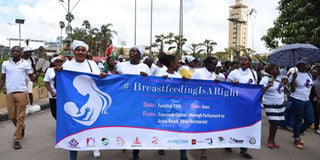Exclusive breastfeeding 'can help tackle climate change' and this is how

Participants during a breastfeeding awareness demo in Nairobi on May 15, 2018. FILE | NATION
Exclusive breastfeeding of toddlers and infants for six months, with little production of formula milk could help in combating climate change, a study reveals.
A study by scientists from the UK Research and Innovation published early this month suggests that “the production of unnecessary infant and toddler formula exacerbates environmental damage and should be a matter of increasing global concern”.
The researchers call on governments to take appropriate measures to support breastfeeding “as part of a global commitment to reduce carbon footprints in every sphere of life.”
According to the study, the food industry, especially dairy and meat production, is responsible for 30 per cent of global greenhouse gases.
Most formula is based on powdered cows’ milk. Methane from livestock, the researchers say, is a “powerful and significant greenhouse gas and cow milk has a water footprint of up to 4,700 litres per kilogramme of powder”.
Dr Natalie Shenker, UK Research and Innovation Future Leaders Fellow at Imperial College London, says breastfeeding for six months saves an estimated 95-153kg of carbon dioxide per baby compared with formula feeding.
Additionally, powdered infant formula can only be safe when made with water that has been heated to at least 70°C, giving an energy use equivalent to charging 200 million smartphones each year. The researchers call for improved support for mothers.


